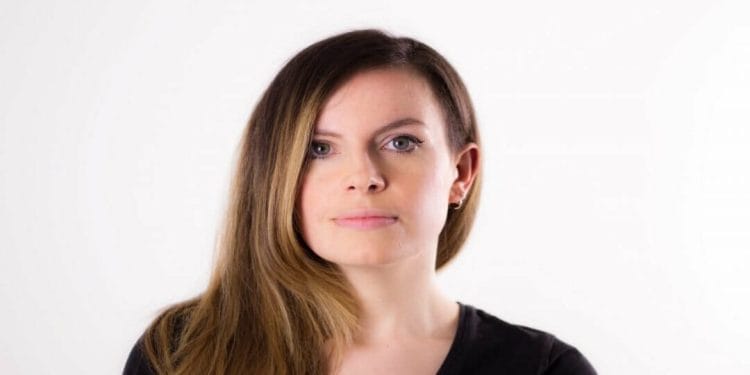Ellen Waddell is a writer, comedian, and performer who used to be the bassist in indie rock n roll band Los Campesinos! She has toured internationally and even appeared on The David Letterman show. She is a BFI funded writer for her short film ‘Stages’, and her debut feature script (co-written with Tom Betts), The Photographic Memory Recalls the Highlights of The Year, is currently in development with Western Edge Pictures and was supported by The Wellcome Trust Broadcast Development Awards.
She has been to the Edinburgh Fringe show several times, previously with stand up shows. Now she has switched to writing about stand up, with Oliver Milburn, her co-writer on Don’t Be Terrible.
Don’t Be Terrible by Ellen Waddell is at Pleasance Courtyard 1st – 25th August (not 12th).
Don’t Be Terrible is coming to Pleasance Courtyard what can you tell us about it?
Don’t be terrible is a dark meta-comedy about stand up, romance and how to fail successfully in life, and on stage. It asks the question ‘can stand up save your love life?’ Our main character, self-confessed nice guy Steve thinks so. That’s why he’s asked Alice, an up and coming comedian, how to perform stand up. It’s his last-ditch attempt to distract his girlfriend from the ‘funny’ guy at work. Unfortunately, misanthrope Alice believes in comedy much more than she believes in love, and may not be quite the guru he was expecting. A comedy about comedy, that asks whether nice is ever funny and whether sexy is ever nice.
What inspired you to write the show?
I had been performing stand up for a few years and often used it as a cathartic way to deal with real-life events, almost as a form of therapy. The night after I got dumped after a 5-year relationship, I did a very angry and bitter set, and was then inspired to write a piece about two people who also used stand up to deal with their love lives. One to fix a relationship and one to get over a relationship. I pitched the idea to Oliver, who I had worked with previously, and together we wrote the script.
Is it based on real events?
A lot of the play is based on myself and Oliver’s experiences and observations of relationships, our own and other peoples, as well as our past reactions to breakups. Alice’s stand up sets are the actual ones I wrote during my break-up. But she is the far more cynical version of me, the person I could easily have become if I really let myself get jaded by that experience. So I think a lot of the characters experiences is also our own bitter wish fulfilment, or dark paths we could easily have gone down.
What’s the one thing about Don’t Be Terrible makes it different from all the rest?
Don’t Be Terrible straddles the line between stand up and play. Essentially, there is no fourth wall between the audience and the cast, and this often makes it a highly interactive and spirited performance. But, it also means the audience are highly involved in the character’s journey’s as they are essentially invited into their world, and become very embroiled in the success of Steve as a stand-up, and his attempts to make them laugh.
How does it feel to be at Pleasance Courtyard?
It feels like a huge honour. Having been to the Fringe several times before, both as a punter and performer, having a show on at The Pleasance Courtyard is something I have been aiming towards for years. I have seen some of my comedy heroes within those hallowed walls, and so to be alongside them this year feels like a dream come true.
Who will Don’t Be Terrible appeal to the most?
Don’t Be Terrible will appeal to comedy and theatre fans alike, but will highly resonate with male viewers. Our main character, Steve, is one of life’s nice guys and struggles with ‘bants’ and jibes, which can often be engrained within male friendship groups, or as a way of establishing a hierarchy within a group. The play examines these toxic expectations, pulling apart the idea that being cruel in a ‘funny’ way is an admirable masculine trait.

















